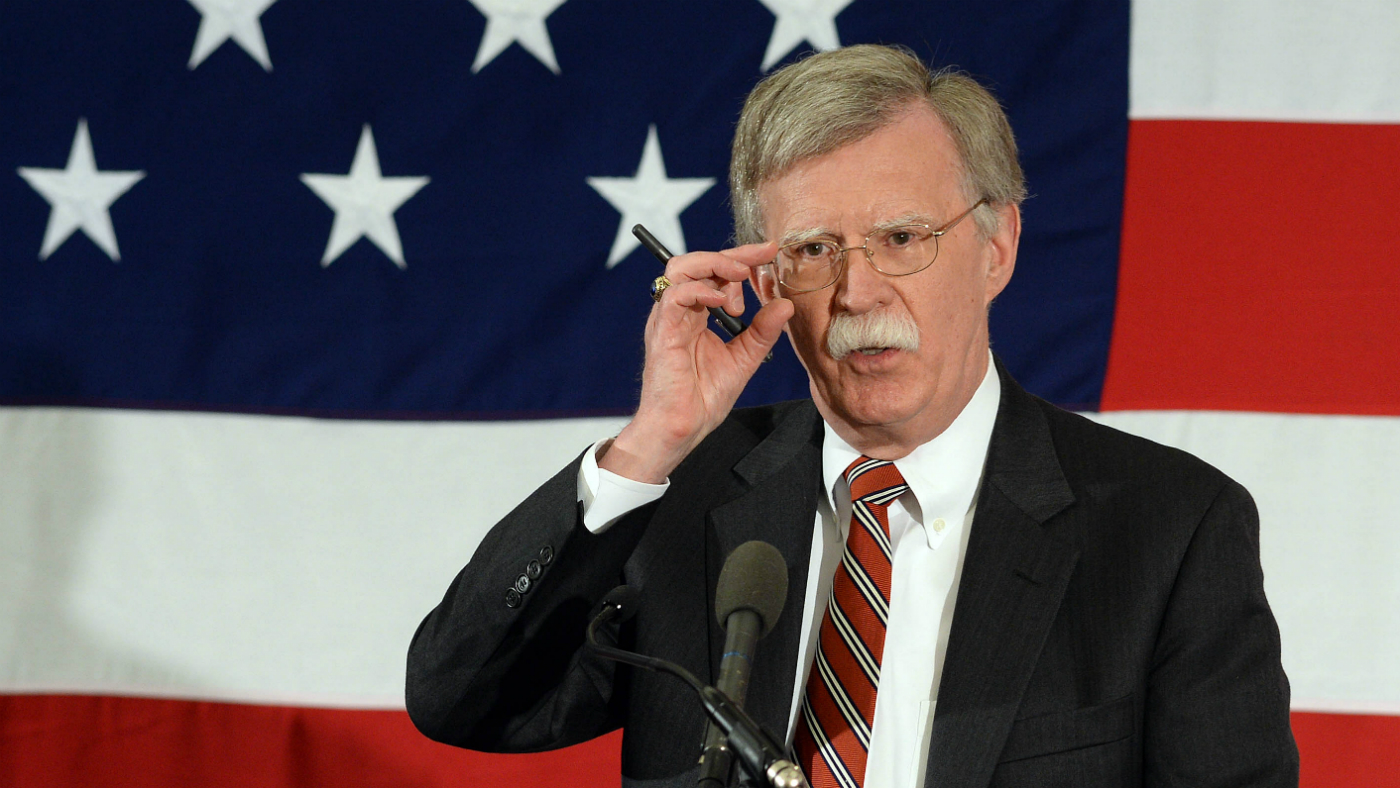John Bolton: who is Donald Trump’s hawkish new national security advisor?
The appointment of a chief architect of the Iraq invasion ‘brings America closer to a new war’

A free daily email with the biggest news stories of the day – and the best features from TheWeek.com
You are now subscribed
Your newsletter sign-up was successful
John Bolton, a Bush-era war hawk who backs the bombing of Iran and North Korea, will soon be in charge of America’s national security policy.
In one of the most controversial cabinet appointments to date – even by Donald Trump’s standards – Bolton will replace General H.R. McMaster as the President’s national security advisor next month.
“The risks of a war with Iran or North Korea are now significantly greater than they were this morning,” New York Times columnist Nicholas Kristof said after yesterday’s announcement.
The Week
Escape your echo chamber. Get the facts behind the news, plus analysis from multiple perspectives.

Sign up for The Week's Free Newsletters
From our morning news briefing to a weekly Good News Newsletter, get the best of The Week delivered directly to your inbox.
From our morning news briefing to a weekly Good News Newsletter, get the best of The Week delivered directly to your inbox.
Bolton, who served under President George W. Bush, was one of the chief architects of the US invasion of Iraq.
As undersecretary of state for Arms Control and International Security in 2002, he pushed the discredited claim that Saddam Hussein was hiding weapons of mass destruction.
There is little evidence that his views have changed since then. “I still think the decision to overthrow Saddam was correct,” Bolton said more than a decade later.
“Hell, even George Bush wasn’t crazy enough to let Bolton serve as his national security advisor. But Trump is,” Kevin Drum writes for Mother Jones. “He wants someone who agrees that we should threaten every bad guy on earth with war, and Bolton’s that guy.”
A free daily email with the biggest news stories of the day – and the best features from TheWeek.com
Richard W. Painter, the chief White House ethics lawyer under Bush, has described Bolton as “by far the most dangerous man” in that administration.
“Hiring him as the president’s top national security advisor is an invitation to war, perhaps nuclear war,” Painter tweeted earlier this month. “This must be stopped at all costs.”
Bolton’s appointment, which does not require Senate confirmation, comes at a crucial – and highly sensitive - time for US foreign policy.
There are growing concerns he could scupper planned talks between Trump and North Korean leader Kim Jong Un and help undo the Iran nuclear deal.
In a recent article in the Wall Street Journal, Bolton argued that “it is perfectly legitimate” for the US to defend itself “by striking [North Korea] first”.
Bolton was previously rejected as a negotiating partner by Pyongyang, after Kim Jong Il’s government described him as “human scum” and a “bloodsucker,” according to Reuters.
He has also been outspoken in his disdain for the deal struck with Iran over its nuclear weapons programme and has called for the US to withdraw from it, a move that is likely to have far-reaching consequences.
“If Trump does not sign the next sanctions waiver on Iran in mid-May, the US will be in violation of the 2015 agreement, quite possibly triggering a new crisis in the Gulf, and opening a rift in relations with European allies,” says The Guardian.
Foreign policy aside, The Atlantic argues that Bolton’s appointment is a “betrayal” of Trump’s base.
“The problem isn’t just that Bolton is singularly ill-suited for the role - he also represents a set of views diametrically opposed to the policies that helped the president secure his job,” it says.
“Trump won the GOP primaries and the White House in part by taking the position that the Iraq War was a dumb waste of American lives and resources.”
-
 How the FCC’s ‘equal time’ rule works
How the FCC’s ‘equal time’ rule worksIn the Spotlight The law is at the heart of the Colbert-CBS conflict
-
 What is the endgame in the DHS shutdown?
What is the endgame in the DHS shutdown?Today’s Big Question Democrats want to rein in ICE’s immigration crackdown
-
 ‘Poor time management isn’t just an inconvenience’
‘Poor time management isn’t just an inconvenience’Instant Opinion Opinion, comment and editorials of the day
-
 Witkoff and Kushner tackle Ukraine, Iran in Geneva
Witkoff and Kushner tackle Ukraine, Iran in GenevaSpeed Read Steve Witkoff and Jared Kushner held negotiations aimed at securing a nuclear deal with Iran and an end to Russia’s war in Ukraine
-
 Kurt Olsen: Trump’s ‘Stop the Steal’ lawyer playing a major White House role
Kurt Olsen: Trump’s ‘Stop the Steal’ lawyer playing a major White House roleIn the Spotlight Olsen reportedly has access to significant US intelligence
-
 Trump’s EPA kills legal basis for federal climate policy
Trump’s EPA kills legal basis for federal climate policySpeed Read The government’s authority to regulate several planet-warming pollutants has been repealed
-
 House votes to end Trump’s Canada tariffs
House votes to end Trump’s Canada tariffsSpeed Read Six Republicans joined with Democrats to repeal the president’s tariffs
-
 Bondi, Democrats clash over Epstein in hearing
Bondi, Democrats clash over Epstein in hearingSpeed Read Attorney General Pam Bondi ignored survivors of convicted sex offender Jeffrey Epstein and demanded that Democrats apologize to Trump
-
 ‘The mark’s significance is psychological, if that’
‘The mark’s significance is psychological, if that’Instant Opinion Opinion, comment and editorials of the day
-
 Judge blocks Trump suit for Michigan voter rolls
Judge blocks Trump suit for Michigan voter rollsSpeed Read A Trump-appointed federal judge rejected the administration’s demand for voters’ personal data
-
 US to send 200 troops to Nigeria to train army
US to send 200 troops to Nigeria to train armySpeed Read Trump has accused the West African government of failing to protect Christians from terrorist attacks